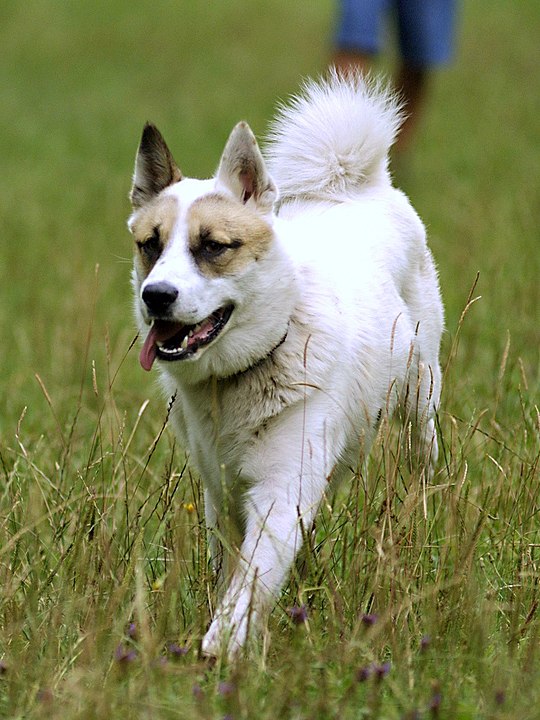The West Siberian Laika is a hunting spitz breed developed in the early 19oo’s. Laika, as a word, means to bark – and this is how the breed would alert the hunter to prey. As such they do tend to use their voices freely, and will bark if they see people/animals/strange objects/anything of interest from out the window! This is also a more primitive breed in terms of behavior and physiology, which means they are slightly different to live with than many other breeds of dog. For example, primitive breeds often only come into season once per year and are exceptionally well-suited to hunt. This particular breed is more likely to bark at/alert to prey then kill it, but in the right circumstance they will. This medium-sized canine sports a thick double coat, a curled tail, and prick ears like other spitz breeds.
The WSL is a loyal breed and can be affectionate to his owner. It can be hard for him to be re-homed if a situation ever necessitates it. This is partially due to his suspicious nature of new people. Many are quite aloof with strangers, although temperament does vary based on the individual dog with some WSLs acting more forward. Outright aggressiveness towards people (without reason) is not favored, so is a rarer trait unless the dog has been poorly bred or socialized. While he shouldn’t be needlessly aggressive towards people, he will guard his owner if he encounters a stranger acting odd, and this highly alert and in-tune spitz will often spot odd behavior even before his owner does. This dog is also protective against predatory animals and has been known to shield his owner from bears and other dangerous wildlife!
The West Siberian is a very empathic breed, often quite in-tune with the emotions of his master. This trait means that he can make a very good emotional support dog. He needs to live in the home with “his people” or this sensitive and emotional dog will become unhappy – likely given to fits of uncontrolled barking! Not only is this a bad situation in terms of his emotions and your neighbor’s ears, but he is a master escape artist and may very well just dig, jump or climb out of the yard – a bad situation for a hunting breed who may then become a nuisance in the community. He instead needs plenty of attention, exercise, dedicated time for mental/physical stimulation (i.e. a job), and a cozy space of his own inside the home. 
WSLs are an active breed and do need regular daily exercise. They should only be owned by active people who plan on taking the dog on frequent walks, hikes and/or hunting expeditions. Carrying a backpack while hiking or walking will give a bit more “oomph” to the workout. Some members of the breed can also be used for herding, which is another great form of exercise! This is an athletic and fast-moving dog that wouldn’t be a good match for someone frail or out of shape. Furthermore, it should go without saying but this is not a dog to keep in an apartment. He needs a large fenced yard – the larger, the better!
With strange dogs, the West Siberian Laika can be downright territorial and even aggressive towards dogs coming onto his property – particularly if the dog is the same sex. This breed definitely distinguishes “known” from “unknown”, a trait that even applies to the animals and pets in the family. Cats, livestock and other pets that he knows are treated as family while strange or wild animals will be chased or hunted. Some do ok with a dog housemate or two while others do not. For best results, keep an opposite-sex pair and raise them together when both young. Even then, there is unfortunately a lot of dog aggression in many lines so some WSLs must live as only-dogs. Keep in mind that this breed has a strong prey drive and will try to chase and/or tree most animals – keeping him on leash when out in public is a very good idea!
The West Siberian doesn’t need much training in order to hunt as these instincts are very ingrained, however he does need to be trained in general house manners and obedience. As this is a very independent-minded breed, it may take more effort to train him. He does have a good memory as well as exceptional problem solving skills, but he can be sensitive and will not put up with any training techniques that he considers too harsh. Treat him with respect but don’t let him push his boundaries too much either, and with time, patience and commitment he is definitely trainable.
